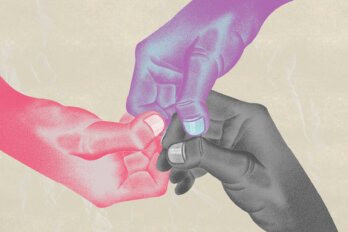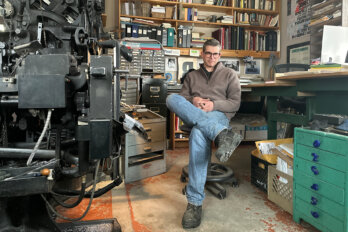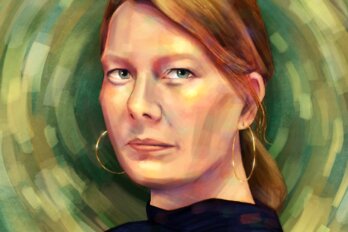Still life bathed in warm light: a porcelain bathtub with claw feet, sumptuous white towels draped over the edge, a table set with a stack of books and a glass of red wine. A Monday night in May, and 400 people fill the darkness of Montreal’s Place des Arts’ Cinquième Salle, waiting for Dany Laferrière. He seems to glide onstage, slim, tall, impeccably dressed in a dark suit and a white shirt open at the neck—a gentleman writer or, as the French are saying, un grand écrivain.
Instant applause. They know him well, maybe too well. How as a penniless refugee from Haiti, he chucked his menial job to write a novel about a penniless Haitian refugee writing a novel about himself. A mythical summer in a sweltering apartment on rue St-Denis, drinking, womanizing, reading, writing about the meaning of it all, sure it would lift him out of poverty and obscurity. He took the manuscript first to Jacques Lanctôt, the former FLQ activist turned publisher, warning him to expect a bomb. And he was right.
To the monoculture of Quebec, caught up in the sovereignty debate, Comment faire l’amour avec un Nègre sans se fatiguer offered an exhilarating mix of provocation and humour. Politics, too, but nothing to do with local obsessions. “In the scope of Western values,” the narrator announced, “white woman is inferior to white man, but superior to black man. That’s why she can’t get off except with a Negro. It’s obvious why: she can go as far as she wants with him. The only true sexual relation is between unequals.”
Published in 1985, it was an instant bestseller in Quebec. The translation by David Homel, How to Make Love to a Negro, came out a year later, drawing delirious reviews across Canada as well as in the UK and the US. And, as in the novel, life obeyed art. The author was invited on Denise Bombardier’s popular Radio-Canada TV show, leading to an avalanche of publicity, which he parlayed into a media career spanning the gamut from TV weatherman (a job he famously once performed naked) to talk show regular, literary columnist, and filmmaker. His second book, éroshima, found the author reading the Japanese poet Basho and enjoying sex with Japanese girls. A new book followed every year or so, always first person, in the same pithy style and often very funny—a chronicle of the life and times of a narrator everybody figured must be Dany Laferrière.
“I like to read in the bath,” he says, grinning, as he steps into the tub at Place des Arts. A wink to a recurring scene in his books, the action draws faint laughter. Maybe it’s the suit, or that the stunt seems out of sync with the auth-ors he has chosen to present: Borges, Thucydides, Juan Rulfo, Virginia Woolf, and Michael Ondaatje, names plucked from the highbrow reaches of his personal library. No sign of Bukowski, and not a whiff of Henry Miller, though he surely owes them a debt.
Clowning around has always been Laferrière’s forte, but it’s not what readers expect from a recipient of the Prix Médicis. Presented annually in Paris to a young French writer whose work shows innovation in style and tone, the award bestows enormous prestige. Only one other Quebecer has won it: Marie-Claire Blais, in 1966. She was twenty-seven years old.
At fifty-seven, with almost twenty books to his credit, Laferrière is hardly a young writer, and certainly not unknown on the international literary scene. Nor does he meet the Médicis’ informal requirement of being “an author whose fame does not yet match his talent.” In fact, until recently, some would have argued the reverse. Says La Presse columnist and long-time friend Nathalie Petrowski, “A new book would come out, he’d talk about it on TV, be everywhere, and people would think they didn’t have to read it.”
But L’énigme du retour, the 2009 book for which he was awarded the Médicis, has changed all that, propelling him into the pantheon of world writers whose moral authority dignifies the appointments of global culture. The guy who once begged bookstore owners to stack his books in their windows, threatening to cry if they didn’t, and who paid for a poster featuring a ceiling-high erection covered with a bedsheet and plastered it around town himself, is finally fading into his much-mythologized past.
Born April 13, 1953, in Port-au-Prince, Windsor Klébert Laferrière was named after his father, a politician forced into exile for opposing dictator François “Papa Doc” Duvalier. The young wife he left behind gave her four-year-old son a new name, Dany, to hide his identity, and sent him to live with her parents in the coastal village of Petit-Goâve. He was educated in schools run by Québécois missionaries and, after high school, worked as a journalist. In 1976, a close friend was assassinated by supporters of Duvalier’s son and successor, Baby Doc, while another was thrown in jail. Fearing for his life, Laferrière took the next flight to Montreal, telling no one but his mother.
His early years in the city are vividly recalled in 1994’s Chronique de la dérive douce (A Drifting Year, 1997) as a drudgery of factory work made bearable by reading and readily available girls: “I wrote to my mother at the beginning of February and asked her to imagine a refrigerator in which six million people live.” As an immigrant, he started at the bottom of Montreal’s sizable Haitian community, a status made all the more painful by the visible success of so many educated Haitians in the city’s professions.
Yet that kind of success wasn’t what he had in mind. “I wanted to be a writer and to be read,” he recalls. “But even more, I wanted to be known.” Mission accomplished. To the Haitian taxi drivers of Montreal (who dominate the industry), he’s a hero, his first book still a marvel. Is it accurate, though? The question inevitably draws laughter. They swear white women melt for Haitian men. “Ask our women,” one driver advised me. “Everything he wrote is true!”
Speaking to a Montreal audience earlier this year, Laferrière claimed to have only one quality: “I can adapt to anything, even happiness.” A typical Danyism worthy of Wilde, yet the quality more often mentioned by those who know him is loyalty. He has a circle of close friends from many phases of his life. He keeps in touch. And although his public image as a ladies’ man rivals Leonard Cohen’s, he has been married to Maggie Berrouet, a nurse, for some thirty years (they have three grown daughters). Petrowski says at one point she started to doubt the existence of a wife and insisted he bring her over for dinner. He did. “She’s nice,” the hostess recalls. “She likes to mock him.”
His professional loyalties also run deep. Pascal Assathiany, general manager of Quebec publishing powerhouse Les éditions du Boréal, says Laferrière could have jumped to a larger publishing house years ago, but came to him only when Jacques Lanctôt sold VLB in 2005; and approached Grasset in France only after Le Serpent à Plumes went bankrupt. Assathiany points to a convergence of factors behind Laferrière’s international breakthrough, but admits Boréal did set out to reposition its writer. “He came to me and said, ‘I’m very famous, but not many people read me.’ So we tried to direct him toward more literary events. Perhaps he isn’t as funny as he used to be, but he’s going inside himself more, back to his roots. Dany really is an intellectual writer; he knows what he’s doing.”
The first Boréal/Grasset publication was Vers le sud (2006), the “comma” in his literary career, suggests Assathiany. Published last year in English as Heading South, the collection of stories was adapted from a film by French director Laurent Cantet, best known for serious social commentary. He, in turn, had pulled from some of the writer’s earlier work for his screenplay and cast Charlotte Rampling as a steely-eyed cougar in 1970s Haiti, who is reluctantly forced to share her black lover with a Valium-popping American who has fallen in love with him. The subject is vintage Laferrière, but the more solemn tone points in a new direction.
Next came I Am a Japanese Writer—translated by David Homel and scheduled for publication this fall by Douglas & McIntyre—a return to both the spirit and the location of his first novel, yet the message is a complete contrast. Badgered by his publisher for a new book, a writer (who lives in a tiny room on rue St-Denis) is blocked, and to stall him blurts out a provocative title: Je suis un écrivain japonais. Since he’s black, some people don’t believe him; others are furious. During the months that follow, while he seduces Japanese women, reads Basho, and hangs out in cafés, rumours of the book’s existence create a literary storm.
Says Homel, “The novel is quite obviously a send-up of identity politics, of who you are as a writer and who you are allowed to be in Quebec. It’s a critique of nationalism, especially as it operates in the cultural sector here. But as always with Dany, the point is oblique. He could also be talking about nationalism anywhere.” Or, more personally, how he played the game early on.
With a nod to The Enigma of Arrival, Nobel Prize winner V.S. Naipaul’s autobiographical novel about a young Trinidadian’s youthful discovery of England, L’énigme du retour is cool and elegant, a patrician vision of the established writer’s return to his country of origin, where he might take his place as moral leader and great writer. This time, the narrator has shed his childhood nickname and reverted to Windsor. Awoken by a phone call announcing his long-absent father’s death, he first takes a trip through Quebec, saying goodbye to friends, then swings by New York, where the old man has lived for decades, alone and in poverty. A briefcase left in a bank vault may or may not be important; missing the combination, he elects to leave it behind.
Arriving in Haiti for the funeral (without a body), he stays in a hotel, reconnects with old friends, and has long conversations with his young nephew, Dany, an aspiring writer. The story isn’t about the death of his father, which actually occurred a year before his first novel was published and which he explored in subsequent books. Rather, it’s about stepping into a father’s shoes; about looking at a ravaged nation not as the guilt-ridden son who left, but as a successful patriarch, ready to lend a hand.
Laferrière has visited Haiti more frequently than have the protagonists of his novels. He was there last January for a literary festival when the earthquake hit, and was unable to make contact with his wife in Montreal for days. Close friends lost their lives. He recorded the experience in a notebook as it happened, and a few weeks later published Tout bouge autour de moi (“Everything around me moved”).
A small book written as he criss-crossed the globe, Laferrière’s first-hand testament is vivid, perceptive: sleeping under the stars that first night, knowing that whoever else was alive must be outside, too; holding a rescued baby in his arms; trekking up a hill to find the aged poet Frankétienne still alive and, across the road, his eighty-year-old mother and her sister. And, most tellingly perhaps, walking into a literary event in Brussels shortly afterward, realizing he was not just the famous writer, but Haiti incarnate.
At one point during the days following the earthquake, his nephew notices he’s been taking notes and asks him not to write a novel about it. “I can’t make that promise,” Laferrière quotes himself. “A classical novel that takes place in one location (Port-au-Prince), in one time (4:53 pm), and took as many lives as a war. For that, you need a Tolstoy.”
Which one of them—the boy or his uncle—will be Haiti’s Tolstoy is an open question. In the meantime, Dany Sr. is left to slog it out as an internationally acclaimed writer, attending back-to-back promotional gigs and literary events. By the time I finally catch up with him, at the end of yet another festival where he has presided as the guest of honour, I’ve read so much about and by him, the inevitable interview seems almost redundant. The omnipotent “I” is ringing in my ears; he’s exhausted. Having every reason to beg off, he slumps into a chair in the bar of a downtown Montreal hotel and smiles politely. I open my notebook.
Q: Tell me something about yourself that isn’t in your books.
A: (laughter) I can’t do that. My publisher would be furious. I have to save it.
Q: Is the Dany Laferrière we know from your books a mask?
A: If he is, then I’ve become him. I am my books.
Q: All right, then, tell me: how do you make love to a black guy without getting tired?
(He smiles, then sighs.)
A: Let him do all the work.
This appeared in the September 2010 issue.





